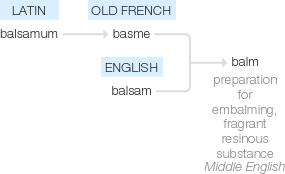Balm
Middle English (in the sense ‘preparation for embalming, fragrant resinous substance’): from Old French basme, from Latin balsamum (see balsam).
wiktionary
From Middle English bawme, from Anglo-Norman and Middle French baume, from Old French basme, from Latin balsamum, itself from Ancient Greek βάλσαμον(bálsamon). Spelling modified 16th c. to conform to Latin etymology. Doublet of balsam.
etymonline
balm (n.)
c. 1200, basme, "oily, resinous aromatic substance exuding naturally from shrubs of the genus Commiphora," from Old French basme, baume, balme "balsam, balm" (12c., Modern French baume), from Latin balsamum, from Greek balsamon "balsam," from Hebrew (Semitic) basam "spice," which is related to Aramaic busma, Arabic basham "balsam, spice, perfume." The spelling was refashioned 15c.-16c. on the Latin model. Compare balsam.
As the name of a tree from which it comes, late 14c.; from mid-15c. extended to various fragrant garden herbs. Also by extension, "any aromatic preparation used in healing wounds or soothing pain, or as a perfume or in anointing" (late 14c.). Hence the transferred sense of "healing or soothing influence" (1540s). Biblical Balm of Gilead (esteemed for its medicinal properties) is from Coverdale (Jeremiah viii.22); the Hebrew word there is tsori, which was rendered in Septuagint and Vulgate as "resin" (Greek rhetine, Latin resina).
